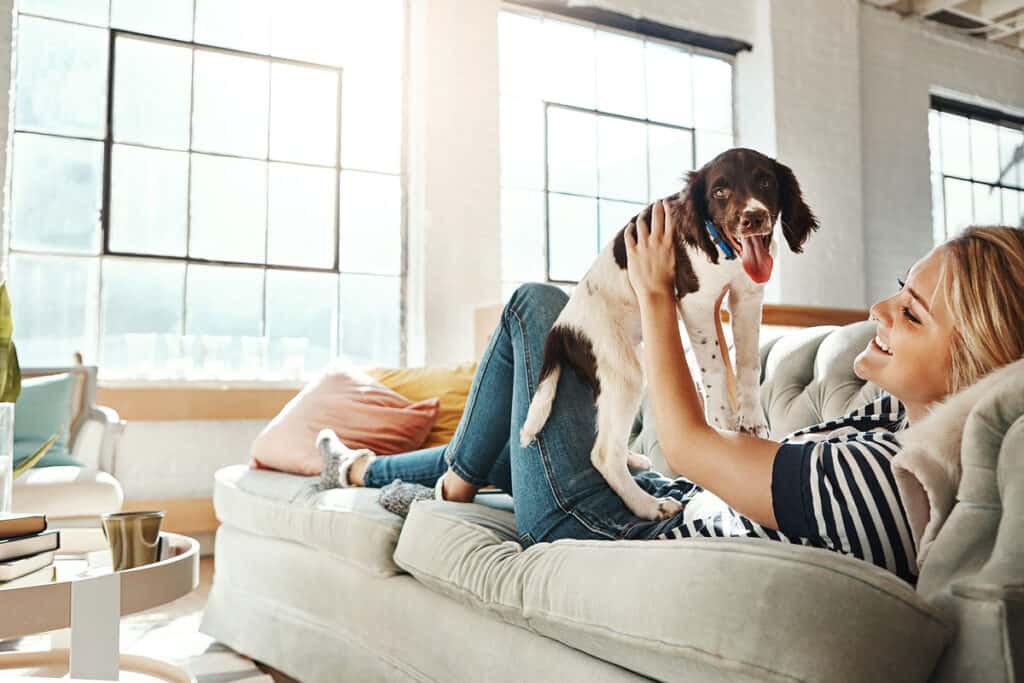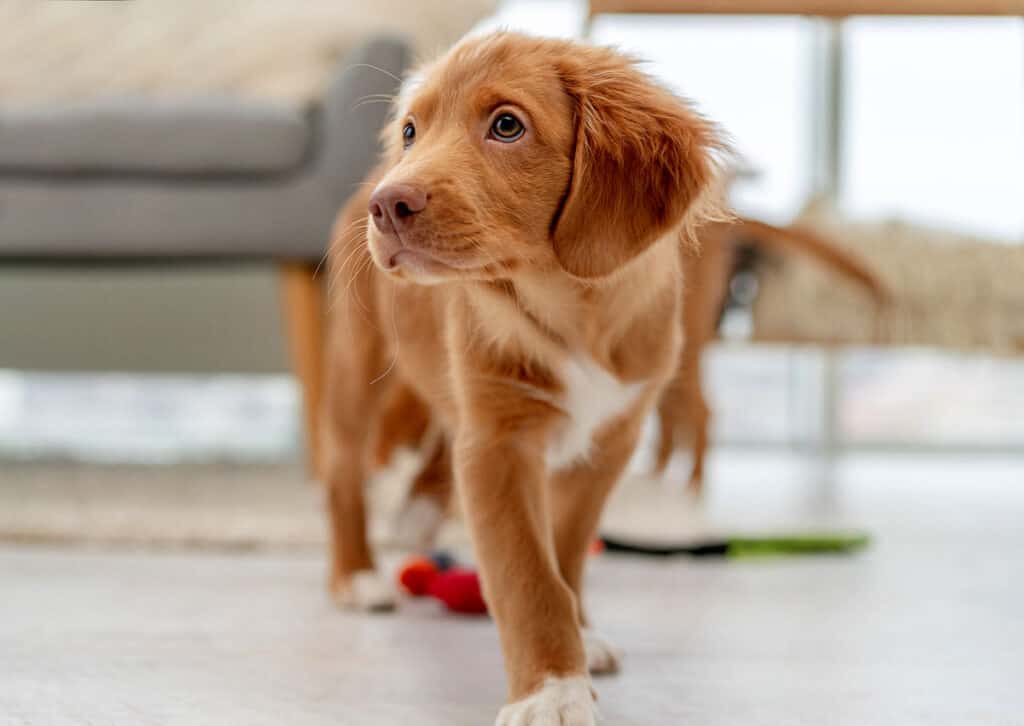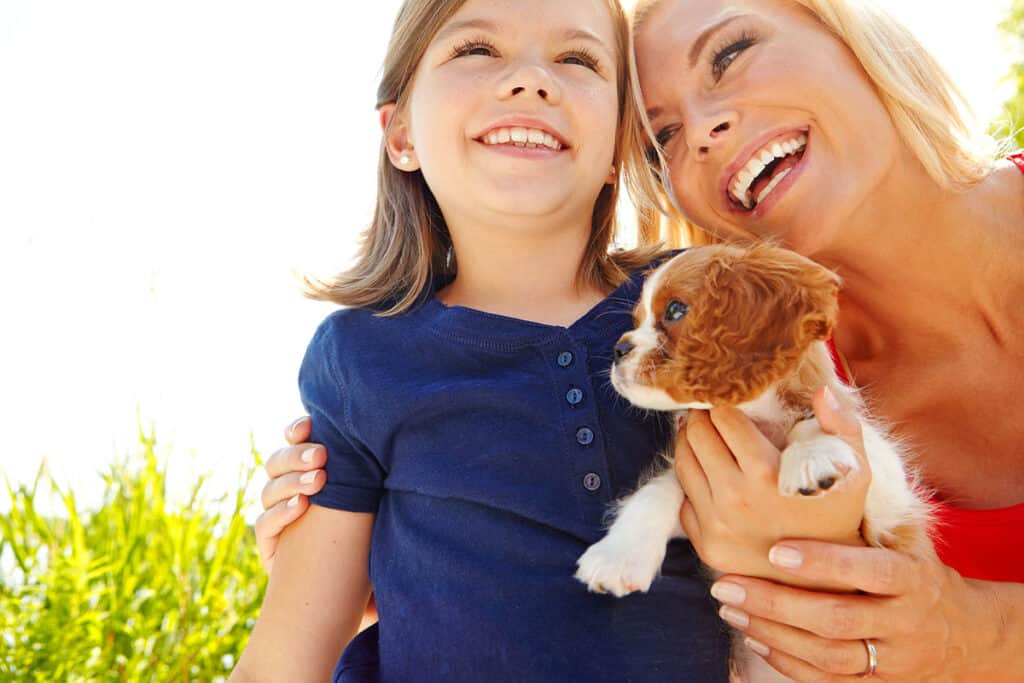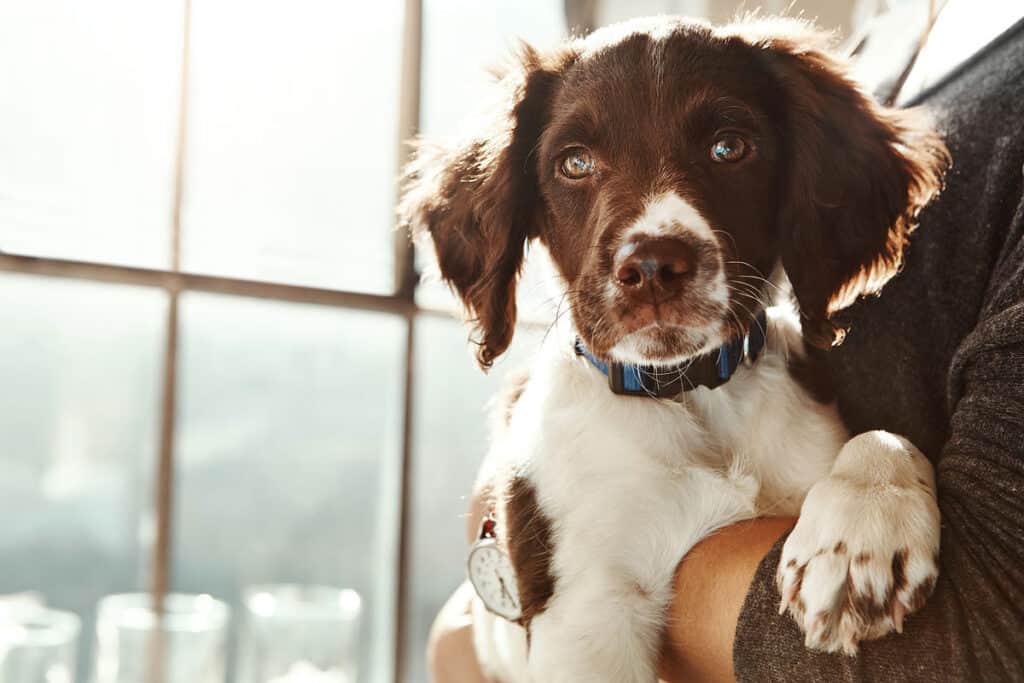Congratulations, you’re a new puppy parent, and with those adorable eyes and wagging tail, it’s hard not to fall in love with your furry bundle of joy. But, as with any new parent, you may feel a bit overwhelmed. These expert tips and tricks will guide you through the ups and downs of puppy parenthood so that you can enjoy every moment with your new best friend.

Bringing a new puppy into your family is exciting, but it’s not something that should be taken lightly. Whatever breed of puppy you choose, getting a new dog should be approached with lots of planning and forethought— especially if you’re a first-time puppy parent.
Are You Ready?
As much as everyone loves puppies, having one requires careful preparation. Young puppies must be fed several times daily and taken outside immediately after eating or drinking. They can’t be left alone for extended periods and require constant attention. Can you be interrupted during essential work calls? Could you stay calm when your new pair of shoes go missing?
There are a lot of decisions to make before bringing a family dog home. Step back and decide if now is the right time and if you have the time to commit to a puppy.
What Type of Dog
If you are ready to take on the responsibility of becoming a puppy parent, there are some decisions to make that may require some reflection and research. First, examine your lifestyle and living conditions, as this will significantly influence what type of dog you should get. Do you have enough space to raise a large dog? Are you ready to take care of a pet that sheds a lot? Do you have kids and want a family-friendly companion?
Consider one of the friendliest dog breeds if you’re a first-time dog owner. Research the breed and talk to someone who owns one to find out more before making a decision..
Shelter or Breeder
Another decision you will make as a dog parent is whether you want your puppy to come from an animal shelter or a dog breeder. If you have your heart set on a particular breed already, take your time to verify the breeder. A responsible breeder will want to interview and meet you to ensure you can provide the conditions for a puppy to flourish. You can start by checking out the American Kennel Club to verify a reputable website or breeder.
If you are ready to adopt a rescue dog, visit dog shelters in your local area, and they will be more than happy to help you on this journey. Dogs make your life better, and by rescuing one that needs a loving home, you are making their life better, too.
How To Puppy-Proof Your Home
Having a puppy is more like having an energetic toddler than a baby. They want to experience the world by touching, smelling, and chewing everything. It is vital to dog-proof your living space.
Examine your home from a puppy-eye view to see what potential hazards could arise. Ensure there are no small objects on the floor or within reach. You don’t want your new puppy biting on loose cables, cords or wires in your house. Don’t forget to put your plants out of reach, as these can harm your furry friend. Ensure cleaning supplies and the medicine cabinet are unreachable as well. Puppy-proof the kitchen by removing anything edible from tables and counters, and keeping drawers and lower-level cabinets closed at all times.

Surviving the First Night
The first night is as big of an experience for you as it is for the puppy. If you’re bringing them to a new house, introducing the new surroundings gradually might be a good idea. First, show them their safe space and where to find food and water.
The first few nights with a young puppy are the trickiest simply because the pups are used to sleeping beside their siblings or mother, so being emotional after separation is understandable. It is essential to stay positive and support them in this journey.
From the very first night, you need to decide whether your dog will be sleeping in their own space or allowed in your bed. Changing this later could be very stressful.
Crate Training
Many puppy parents crate-train their dogs. A crate will become a safe space for the puppy if done correctly. Let the pup explore the crate on its own terms. Make it comfortable and inviting. Place some treats and toys inside the kennel. Extend crating over time and make it a positive experience for the dog. It is worth investing time and effort in creating a haven for your puppy.
One of the top tips for new puppy owners is to have the pup sleep in the crate from the first day. You can let the new puppy sleep in the crate in your bedroom if you want them close by.
Picking a Name
After all the hard work and research, it is time to have fun and consider what you would like to name your dog. Do you want a unique dog name like Qwerty, Chopper, or Mojo? You can go with more common names, but a unique name may be what your pooch needs. Consider the dog’s personality, breed, type, color, shape, or size to inspire a name.
Establishing a Routine
Following a routine from day one will help your puppy develop good habits immediately. Have a schedule for feeding, walking times, and potty breaks. Is the puppy allowed in every room of the house? Is the new dog going to be sleeping in your bedroom? Will you let the new pup have food scraps from the table? Determine what works best for you and stay consistent. If a dog is allowed one of these things once, it will also expect the same behavior the next day.

Start House Training Early
It is best to take your puppy outside for potty training as soon as they finish eating or drinking. However, their bladders form fully around 12 weeks old. When you bring your puppy home, they may need to go out for a toilet break as frequently as every 15 minutes. Stay patient and expect accidents.
Set up a schedule for puppy toilet training around other activities. Include toilet breaks at bedtime and when the new pup wakes, plus feeding, play, and nap times. If you are out of the house for an extended period after the puppy’s arrival, a dog walker or neighbor could help with play and toilet breaks.
Puppy Training
Prepare to teach your new pup at an early age how to behave. Reward-based training methods are effective, especially with food-motivated puppies. The concept of this training method is to reward your puppy when they behave well so that it will repeat that behavior. You should not reinforce bad behaviors.
There are puppy classes, private lessons, and YouTube videos to help new puppy parents start training. Begin with simple commands and train consistently.
Teaching a Puppy To Focus
We all know what it means to be distracted and not focused. It is even harder to learn something new in this state. The same principle applies when training your puppy. Teaching them to focus on you early on will improve your further training and connection. Do this in a quiet room and use positive reinforcement when your eyes meet. Once you’ve mastered attention-grabbing in a quiet room, move forward to different environments.
How To Socialize Your Puppy
It is commonly misunderstood that socialization means the same thing for humans as it does for dogs. For people, it means interacting with other people. For dogs, it means interacting with other dogs and new environments while listening to their owners above anything else. Socialization is vital whether you are in the neighborhood around your home or away on a road trip.
Given so many options for different breeds, characters, and households, there are many ways to train your puppy. First, research your puppy’s breed, as they might have some qualities of their own. Second, adjust the training based on the environment where they will live. Socialization for city life will look different than training for a dog that lives on a farm.
Lastly, consider what you and your dog will do throughout the year. If hiking with your dog or taking it to the office, you must plan to familiarize them with these situations.
Stay Positive
It is commonly agreed that positive reinforcement is one of the best ways to train your dog. Positive reinforcement means rewarding good behaviors instead of punishing bad ones. Have a lot of high-value, delicious treats ready during the training sessions. Avoid punishment, as this can create fear and anxiety.
Don’t go overboard with the dog treats, and make sure they are good quality. Consider homemade dog treats so you know what is in them.

Monitor Their Health
Schedule a visit with a vet within a few days of bringing your puppy home. Stay consistent with the vet visits and be alert for any signs of illness or injury. Make sure to put the veterinarian clinic number in your contacts.
Consider getting pet insurance for your four-legged friend. When you sign them up for insurance, the younger your dog is, the better coverage you will receive.
Vaccinations
There can be many different opinions on this topic, including what vaccinations to get and in what timeframe. An excellent place to start would be your local veterinarian.
Choosing Dog Food
Another big decision for your puppy is about its diet. You can choose between premium puppy food, homemade foods, or holistic diets. Whichever option you select, ensure your puppy gets enough nutrients and calories for growth. Again, do some research and consult with your veterinarian.
Holistic Dog Care
Having a dog requires not only a lot of time but also a lot of supplies. If you want to be more mindful of how you and your dog consume, there are some excellent alternatives to mainstream products.
You can include your puppy in the journey of a conscious lifestyle, from letting your dog join you to practice mindfulness to ensuring their gut health.
Create a Puppy Budget
The most considerable expense for a healthy adult dog is a constant food supply. However, getting a puppy for the first time requires a lot of upfront costs. The bare essentials include a dog bowl, leash, collar, dog bed, toys, a crate or kennel, and food. Most of these will wear with time or be outgrown and need replacing.
Vet visits and vaccines will increase your budget at the beginning as well. Consider putting aside extra cash for emergencies, like illness.
Getting a puppy involves many preparations and responsibilities, but it is a beautiful and exciting time. It is a life-long commitment that no one should take lightly. But, once you are ready, enjoy the process and prepare to welcome your new family member.